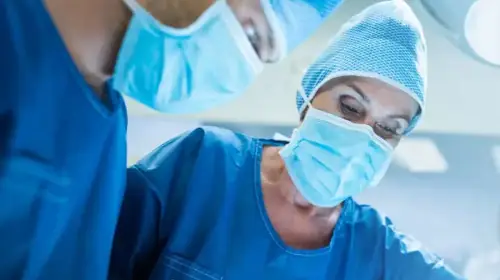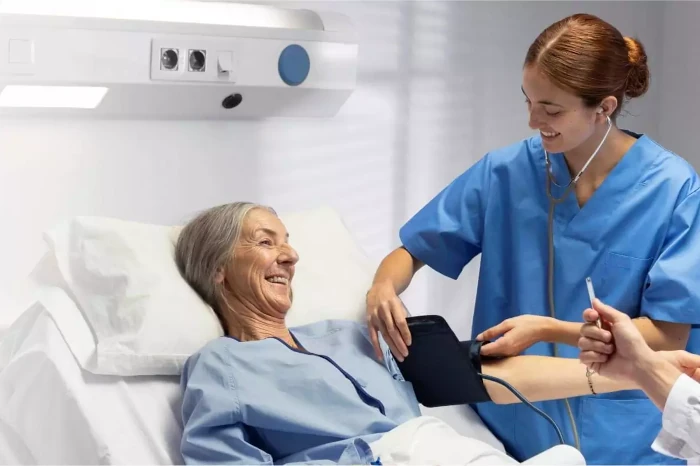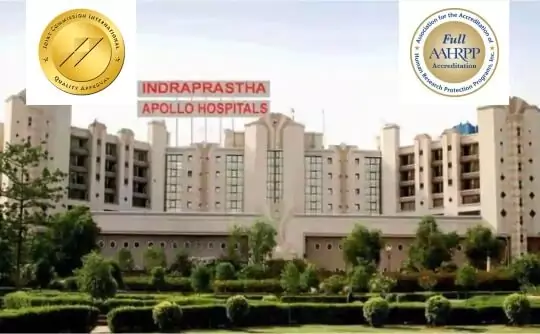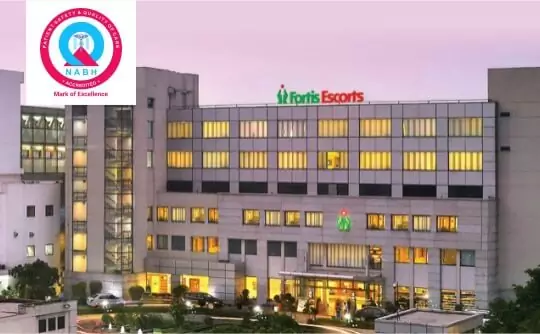

One of the key costs you will face when undergoing an ASD device closure procedure in India is the surgeon's fee. IndiCure Health Tours connects you with some of the surgeons in India who are highly skilled and have delivered successful heart surgeries. While the surgeon's fee can vary based on their experience, you can trust IndiCure to recommend surgeons who prioritize your safety and deliver excellent surgical outcomes when you choose to undergo heart surgery in India.
In pursuit of enhancing patient care, novel techniques, and technologies are sometimes introduced into the surgical procedures. These innovative enhancements in surgical methods may lead to elevated expenses for your ASD device closure cost in India.
Choosing an accredited surgical facility with skilled and qualified medical staff is crucial for the success of the ASD device closure procedure. In India, the larger cities typically offer superior medical facilities and have more experienced surgeons, usually resulting in higher costs as compared to the smaller cities. IndiCure Health Tours specifically recommends surgical facilities in larger cities of India in order to prioritize quality of healthcare and ensure patient safety.
Surgery-related costs encompass both pre- and post-operative expenses. Pre-operative costs are influenced by factors such as the patient's age and medical condition, determining the necessity and type of investigations needed. Post-operative expenses may involve prescribed medications and subsequent follow-up appointments.
At IndiCure Health Tours, we consolidate most of the expenses for your ASD device closure in India to provide you with an inclusive and cost-effective package tailored to your budget and individual requirements. After receiving medical reports, your case manager will provide an estimated surgery cost based on a discussion with the heart surgeon.
The final ASD device closure cost in India can however be confirmed after detailed investigations and your face-to-face consultation with the heart surgeon.

We Help you Choose the Right Treatment, Surgeon & Hospital

We Arrange Video/Telephonic Consultation with the Surgeon

We Assist you with Visa & Accommodation

We Receive you at the Airport and Drop you at Hotel/Hospital

We Assist you the at Hospital & Provide Post Operative Support
We work for hospitals and get you the discounted rates. You get the best value and save money on your medical trip to India.

Here is a set of questions you should consider asking before commencing your medical tour for ASD Device Closure in India.
Atrial septal defect (ASD) transcatheter repair, also known as ASD device closure, is a procedure to fix a hole in the atrial septum. The atrial septum is a wall that separates the right and left upper chambers in the heart (atria). This hole is called an atrial septal defect or ASD.
When the septum does not form properly, you are born with an ASD (congenital defect). A "hole in the heart" is what it is commonly known as.
Atrial septal defects are the third most frequent type of congenital heart abnormality and the most common among adults.
A secundum ASD is a hole in the septum's center. Blood can flow from one side of the atria to the other through the hole. The direction is determined by the amount of pressure in the atria.
Because they do not show symptoms, many people are unaware that they have ASD. When a chest X-ray for another illness reveals that the right side of the heart is larger than normal, some people learn about the defect.
A unique closure device is used to conduct percutaneous closure of PFO and ASD. The device is folded or attached to a special catheter, which is comparable to the catheter used during your catheterization procedure. The catheter is moved into the heart and through the defect after being put into a vein in the leg. The device is progressively pushed out of the catheter, allowing each side to expand up and cover each side of the opening (much like a sandwich), effectively closing the hole or defect. The device is removed from the catheter once it is in the appropriate place. Heart tissue grows over the implant over time, becoming a part of the heart. The procedure is monitored by X-ray and an ultrasound camera inserted in the heart from a vein in the top of the leg.
When a child is between the ages of four and six, ASD Closure is advised if a moderate to large defect is there. When a problem is discovered in a young adult, the advantages of closure are significant.
Patients who don't qualify for catheter-based closure devices may need surgery to close their septal defect. There are minimally invasive and robotically assisted methods available. Congenital heart cardiologists, interventionalists, and surgeons collaborate to ensure that each patient receives the best treatment for their condition.
The procedure is done in a Catheterization Laboratory. During the procedure, the surgeon will utilize a minimally invasive approach by inserting a small, flexible tube known as a catheter into an artery located in the groin area. This catheter is designed to contain a small device within it.
The surgeon will carefully maneuver the catheter through the blood vessel, starting from an artery in the groin area and guiding it through the arterial system towards the heart. Using X-rays and echocardiograms, the location of the catheter can be tracked as it progresses toward the atrial septum.
The surgeon will deploy the small device from the catheter and position it over the opening in the atrial septum. Then the device will be securely anchored. The catheter will be carefully withdrawn through the blood vessel. The healthcare provider will close and bandage the site where the tube was inserted.
After surgery, patients are taken to the intensive care unit and monitored. Pain is likely, and pain medication is given as appropriate. Patients also are on a respirator and have a breathing tube for the first few hours after surgery.
The length of the hospital stay depends on how quickly a patient recovers and can perform some physical activity.
The outlook after ASD surgery is excellent. Once an ASD has been closed, it's unlikely that more surgery will be needed.

New Delhi
Indraprastha Apollo Hospitals, New Delhi is a state of the art multi speciality tertiary-care hospital situated in the most posh area of South Delhi. Considered to be the flagship hospital of Apollo group, Indraprastha Apollo Hospital is one of the important landmarks not only in Delhi, but in the world map because of its popularity among the medical tourists. The hospital has been one of the most sought after medical institutions for patients from Asia Pacific and beyond.

New Delhi
Fortis Escorts Heart Institute and Research Centre is one of the most revered medical institutions not only in India, but the entire world. The institute has set benchmarks in cardiac care with path-breaking work over the last 25 plus years. The hospital has the most advanced technology and has seen the best outcomes even in the most complex cardiac cases; be it cardiac surgery, Interventional Cardiology, Pediatric Cardiology, Pediatric Cardiac Surgery or Non-invasive Cardiology
Transcatheter device closure of secundum ASD is a maturing technology that has been around for more than a decade. This technique has gained popularity as a non-surgical alternative to surgery, and it is generally considered to be safe and successful.
Even if the child has no symptoms, healthcare providers frequently prescribe a repair for youngsters with a big ASD. It has the potential to protect the lungs against long-term, irreversible harm. The procedure is most commonly performed on youngsters. However, if an adult's ASD was not discovered during childhood, they may also require the treatment.
Larger ASDs (8 to 10 mm) frequently do not close and may require surgery. The size of the defect, the amount of additional blood flowing through the opening, the size of the right side of the heart, and whether or not the person has any symptoms are all important criteria.
Atrial septal abnormalities can cause life-threatening consequences such as chest pain, irregular heartbeats (arrhythmias), abnormal heart enlargement, "fluttering" of the heart (atrial fibrillation), and/or heart failure in severe cases.
Patients younger than 25 years had a normal life expectancy after ASD closure, according to experts.
References :Apart from the ASD device closure surgical procedure cost in India, there are additional expenses to consider when planning your trip. This includes budgeting for meals, airfare costs which will vary depending on your location of origin and the time of booking, and ground transportation expenses, such as taxi fares or rental car costs. Lastly, accommodation costs during your recovery period are crucial to consider, whether you opt for a hotel near the medical facility or other lodging options that suit your preferences and budget.
By carefully considering these additional expenses alongside ASD device closure cost in India, you can better plan and budget for your trip to India, ensuring a smooth and comfortable experience during your recovery process.
The ASD device closure cost in India is significantly lower compared to Western countries. This can be attributed to various factors, including the overall lower cost of living in India and a favorable exchange rate for international patients.
In India, the expenses associated with medical procedures, including device closure for atrial septal defects (ASD), tend to be more affordable due to the lower cost of healthcare services and other resources. Additionally, the exchange rate for international currencies, when converted to Indian Rupees (INR), often provides a favorable advantage for patients traveling from abroad seeking medical treatment.
As a result, many patients from around the world opt to travel to India for ASD device closure and other medical procedures, taking advantage of the cost savings without compromising on the quality of care received.
Enhance your medical journey to India by availing these extra services.
Traveling abroad for medical reasons may be challenging. With our experience of over a decade and working with the best surgeons and top hospitals in India, we help make your medical tour easier and safer for you. We will guide you at every step of the way and make end-to-end arrangements for your surgery, travel, and stay.
Ramandeep Dhaliwal
I had great experience having rhinoplasty through Indicure. Dr. Ruchika from Indicure has helped me in finding best plastic surgeon, answering all my questions...
Read More
Joshua Archer
My name is Joshua Archer I'm from New Zealand, bay of plenty, kawerau I opted for the bypass surgery in January 2023 but planned it in advance for 28 September found IndiCure...
Read More
Kera Ren
Absolutely loved my experience with IndiCure - from first inquiring to meeting the surgeon pre op to my follow up post op. The surgeon was extremely approachable...
Read More
Andreana Paul
Had a wonderful experience. Visited India for my plastic surgery. From sending mails, airport pickup, comfortable accommodation and, to smooth hospital appointment booking...
Read More
Brandi Luce
I had the privilege of using Indicure's services for a cosmetic procedure that I had wanted for a long time but had always been apprehensive about. Ruchika helped me...
Read More
Jade M
Indicure Health Tours went above and beyond my expectations. They helped me with every aspect of my journey and were professional, kind and caring. I was...
Read More
The content on the website (www.indicure.com) is intended to be general information and is provided only as a service. All photographs on our website of before and after results are examples only, and do not constitute an implied or any other kind of certainty for the result of surgery.
Learn about IndiCure Health Tours' comprehensive editorial policy that strives to deliver trustworthy, helpful, relevant, accurate and people-first content on medical tourism in India.
It is not medical advice and should not be taken as medical advice. It should not be used to diagnose or treat a health condition and is in no way meant to be a substitute for professional medical care. You are advised to see a surgeon in person to assess what surgery may or may not accomplish for you.
It is also important to keep your expectations realistic and to understand that all surgical procedures carry risks and should never be taken lightly.